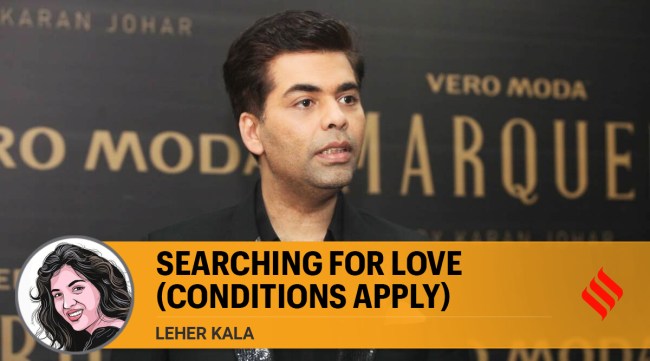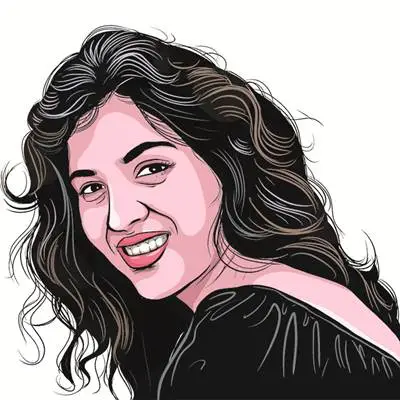Opinion Searching for love (conditions apply)
Leher Kala writes: Internet matchmaking has become ubiquitous even in India, taking on the space once occupied by newspaper matrimonial ads
 Karan Johar has been receiving a lot of flak on Twitter for promoting a “regressive and discriminatory” approach to marriage.
Karan Johar has been receiving a lot of flak on Twitter for promoting a “regressive and discriminatory” approach to marriage. After depicting blowzy romance via wind machines, designer wardrobes and incredulous coincidences, celebrity filmmaker Karan Johar’s latest foray into the business of love is a down-to-earth endorsement of http://www.iitiimshaadi.com. The website, promoted by the very aptly named company Alma Mater Matters Pvt Ltd invites registrations only from alumni of top institutions, with the explanation that “people desire companionship of matching intellects with similar experiences”. It’s perfectly natural that like gravitates towards like, the latest examples being Ranbir Kapoor and Alia Bhatt. But Johar has been receiving a lot of flak on Twitter for promoting a “regressive and discriminatory” approach to marriage, as if India’s unabashedly conservative wedding protocols have ever been anything else.
Internet matchmaking has become ubiquitous even in India, taking on the space once occupied by newspaper matrimonial ads. It can be overwhelming, sorting through lakhs of jeevansathi.com and shaadi.com profiles, constantly worrying about a potential prospect misrepresenting themselves. A friend of mine was alarmed to discover that someone she matched with on Tinder was a truck driver before starting a transport business. I pointed out that Russell Crowe was a waiter before making it in Hollywood to which she snapped she had nothing in common with people in the trucking industry. Right or wrong, we are all shameless traditionalists when it comes to choosing life partners, operating in our own little gilded circles, reluctant to consider an outlier. If one is venturing outside of one’s comfort zone, a filtering is required. That’s where iitiimshaadi.com scores; it makes no bones about sifting out the grain from the chaff, so to say.
It is worth noting that there are over 1,500 matrimonial websites in India, catering to orthodox Hindu demands, largely based on caste. Minorities (Muslims and Christians) would be wasting their time on many of them (however, they have their own specific websites full of equally tasteless idiosyncrasies). A glance through the top five matchmaking sites is a revelation; candidates who fail to identify their own caste and graciously tick “caste no bar” in their quest for a mate have a far smaller pool of responses to choose from. There are two reasons for this. One, Indians are hopelessly insular and casteist. Two, a lack of full disclosure is viewed suspiciously; perhaps a candidate is hiding an unsavoury past. Under the heading “Caste No Bar” I repeatedly saw: “SC/ST Please Excuse”, contradictory yet noteworthy—this is a rare specimen indeed, who stops short of taking a deep plunge but is at least, willing to look beyond his own sub-caste.
It is to be wondered that after all this painstaking anthropological streamlining and pairings based on socio-economic hierarchies, if, a few years in, people do a rethink and decide these yardsticks were wholly idiotic—and that giving oneself up to mad passion might have been more conducive to happiness. But romantic inexperience leads to the fear that the lovers one chooses may be chronically wrong (and there’ll be no one to blame). Mate selection is an issue in other countries too. In the West they go about it like normal adults, picking partners with a shared vision for the future, and similar interests. Critically, mummy-papa are not involved and nobody cares what a partner’s random ancestors did, 300 years ago. Indians approach their personal lives the way they do a 12th Board examination—industriously, the virtues of continuity of society hammered into them.
This attitude of risk averseness has led to an over-dependence on tribe and a cynical distrust of romance. After all, most of literature concerns the perils of scandal and doomed love; in Anna Karenina, Anna leaves her husband for Vronksy, condemning herself to a life of despair and death. Lydia, in Pride and Prejudice, is reduced to poverty by eloping with the county rake, Wickham. In this era, the path to true love may be paved with choices, but the safest is going en route the only destination that matters: a carefully strategized marriage.
The writer is director, Hutkay Films





